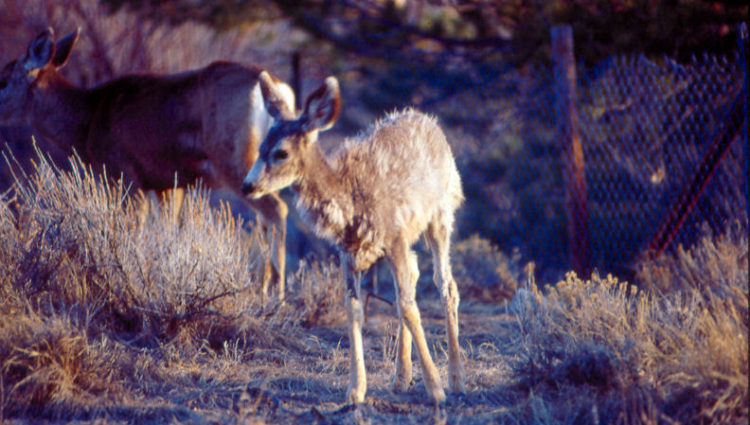
The Wyoming Game and Fish Department asks the public not to feed deer. Multiple dead deer have been collected in the Lander and Jackson regions this spring and taken to the Wildlife Health Laboratory/Wyoming State Veterinary Laboratory in Laramie to determine the cause of death. It turns out most of these deer died as a result of being fed.
Feeding includes allowing access to bird seed, pet foods, vegetable gardens, household waste, and even alfalfa hay. Many “town deer” look unhealthy and in need of better nutrition, but better nutrition does not come in the form of artificial feeding. And the recent lab reports show that feeding, whether intentional or not, is often what begins the decline in the health and eventual death of deer in and around town.
People commonly make the mistake that feeding deer is just as beneficial as feeding other wildlife. Mule deer in particular have a highly specialized digestive system with specific bacteria in their gut to aid in the digestion of natural foods. They do not have the bacteria they need to digest foods outside of this range. Even in places where an organized feeding program has been implemented, mule deer are found dead with stomachs full of undigested food. Instead of searching for an appropriate food source, they fill their stomachs with the feed provided. In addition, artificial feeding tends to concentrate animals together, which is a rich environment for disease transmission.
“When animals are struggling through winter on poor feed, their immune systems are weakened, allowing diseases and parasites to take hold. All these factors add up to make winter survival nearly impossible” says Hank Edwards, a wildlife disease specialist with the Wyoming Game and Fish Department.
At best, feeding mule deer is only successful in making people who are compassionate about wildlife feel better and at worst it could be the factor that ultimately leads to their death.
There are multiple other problems that arise when deer are fed, and for more information see: https://wgfd.wyo.gov/keep-
